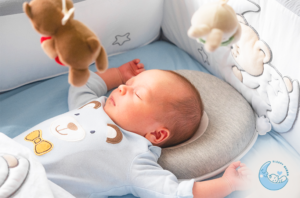You can go ahead and add postpartum hair loss to the list of things no one tells you will happen to your body after having a baby.
While pregnant, you may have noticed that your hair seemed healthier and thicker than usual. You may have also noticed that shortly after the arrival of your little bundle of joy, all that nice hair morphed into a clump that went down your drain. But don’t fret, losing hair after having a baby is completely normal.
That being said, it can still be a source of stress and confusion for new moms so we’ve put together answers to some of the most frequently asked questions we hear about postpartum hair loss.
What causes postpartum hair loss?
The huge amount of hormone production that comes with pregnancy is the main culprit behind postpartum hair loss. While pregnant, a woman’s hCG, estrogen, progesterone, oxytocin, and prolactin levels skyrocket, causing noticeable changes to the body – including to hair.
These hormones lead to healthier hair follicles, which prevents hair from falling out at a normal rate. Thus your hair is thicker and more voluminous than ever before when you’re pregnant. Most women experience a certain amount of hair loss every day, which gets “paused” during pregnancy.
Once the baby arrives, however, hormone levels drop dramatically. So beginning roughly three months after giving birth, to make up for all the hair that didn’t fall out while you were pregnant, you’ll shed more hair than normal.
How Long Does It Last?
After your baby is born, you can expect to see your start falling out within the first few months. Unfortunately, this can continue for as long as one year after the birth of your child but generally peaks around the fourth month. Regulating hormones is a long process that can be frustrating, just know that it will eventually all even out. Honest.
How Much Hair Loss is “Normal”?
Most of the time, any amount of hair loss after having a baby is considered to be normal. However, if your hair loss continues a year after giving birth, you should consider talking to your health care provider to ensure there aren’t any underlying reasons at play for your hair loss.
Will My Hair Grow Back?
Yes, your hair will grow back. Sometimes, however, this hair regrowth process can make your usual styling routine a bit more challenging, as the hairs tend to stick straight up until they’re heavy enough to lay down. If you find yourself in this situation, try these suggestions:
When your hair starts growing back in, consider getting a new haircut to help tame those wild regrowth pieces. Due to the drastic changes to your hormone levels during pregnancy, you may not have the same hair texture you had prior to have your baby, so be sure to take this into account when considering how much to cut off.
Experiment with new products, especially leave-in conditioners and spray gels that help tame the crazy hairs. Try to avoid using heat styling tools and getting any chemical treatments. Accessories like headbands and clips are also great ways to style patchy hair. Overall, be patient with your new post-baby body.
What Can I Do to Promote Hair Regrowth?
There are a few things you can do to help your hair grow back quickly without expending a whole lot of effort. For starters though, if you’re breastfeeding, remember to continue taking prenatal vitamins to make sure your body has all the nutrients it needs. Once you switch your baby to formula or cow’s milk, you can go back to taking a regular daily multivitamin.
A proper diet is crucial when trying to get your hair to grow back postpartum. As such, experts recommend that you eat a balanced diet with plenty of protein. This will not only help your hair grow back but also provide you with the energy and calories you need while breastfeeding and caring for a newborn.
While this is admittedly easier said than done, try to reduce the amount of stress in your life — as much as you can with the new responsibility of caring for your baby, of course. Stress is well-known to negatively affect the body and, you guessed it, make your hair fall out. Also, avoid shampooing every single day, and when you do wash your hair, try using a volume enhancing shampoo.
If you’re still concerned you’re losing too much hair, talk to your doctor about treatments like laser therapy or PRP treatments. Rest assured, your hair will grow back and be back to its old self in no time.

















